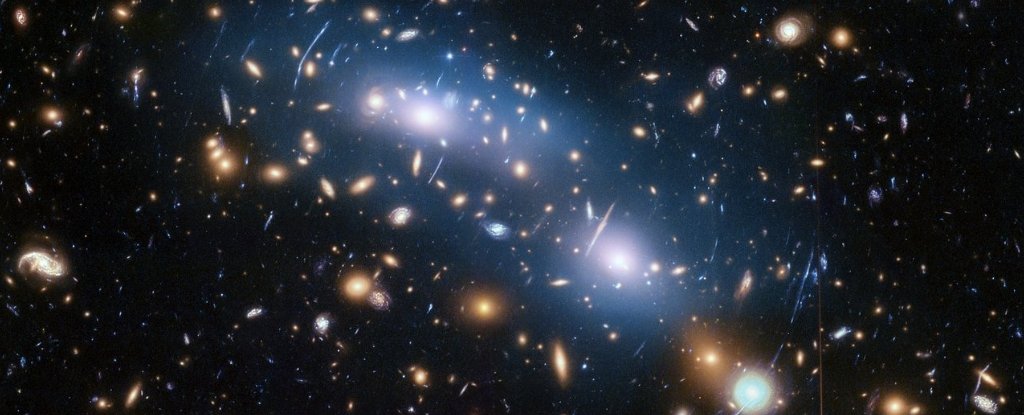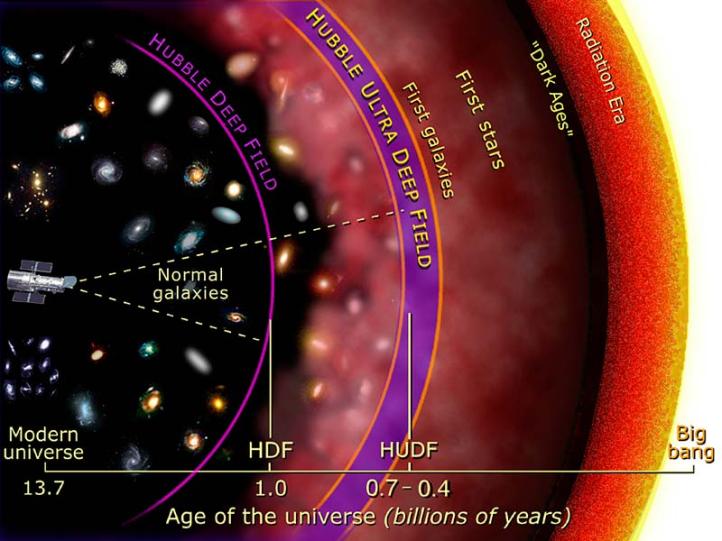
Posted on 06/08/2020 12:56:55 PM PDT by Red Badger
Astronomers don't know exactly when the first stars formed in the Universe because they haven't been observed yet. And now, new observations from the Hubble Space Telescope suggest the first stars and galaxies may have formed even earlier than previously estimated.

Why? We *still* haven't seen them, even with the best telescope we've got, pushed to its limits.
A group of researchers used Hubble to look back in time (and space) as far as it could see, hoping to study these first generation of stars of the early Universe, which are called Population III stars.
Hubble peered and squinted back to when the Universe was just 500 million years old – which is thought to be Hubble's limit — and found no evidence of these very first stars.
The name — Population III – is a little confusing. Shouldn't these first stars be called Population I stars? Let's face it, astronomers have never been great about naming things.
The name Population I had already been taken when astronomers classified the stars of the Milky Way as Population I (stars like the Sun, which are rich in heavier elements). Then, the name Population II was used to classify older stars in the Milky Way with a low heavy-element content.
And that left the name Population III to classify the stars that were forged from the primordial material that emerged from the Big Bang, approximately 13.8 billion years ago.
Population III stars must have been made solely out of hydrogen, helium and lithium, the only elements that existed before processes in the cores of these stars could create heavier elements, such as oxygen, nitrogen, carbon and iron.
Rachana Bhatawdekar of the European Space Agency led this most recent study, probing the early Universe from about 500 million to 1 billion years after the Big Bang.
They studied the star cluster MACSJ0416 (see earlier comment about astronomers naming nomenclature) and the surrounding field with the Hubble Space Telescope, along with using supporting data from NASA's Spitzer Space Telescope and the ground-based Very Large Telescope of the European Southern Observatory).
HFFIllustration of the depth by which Hubble imaged galaxies in prior Deep Field initiatives, in units of the Age of the Universe. (NASA and Feild)
These observations were part of Hubble's Frontier Fields program, which observed six distant galaxy clusters from 2012 to 2017, and produced the deepest observations ever made of galaxy clusters and the galaxies located behind them.
This was achieved by using the gravitational lensing effect, where the masses of foreground galaxy clusters are large enough to bend and magnify the light from the more distant objects behind them. This allows Hubble to use these cosmic magnifying glasses to study objects that are beyond its nominal operational capabilities.

These observations revealed galaxies between 10 to 100 times fainter than any previously observed.
Bhatawdekar and her team developed a new technique that removes the light from the bright foreground galaxies that constitute these gravitational lenses.
This allowed them to discover galaxies with lower masses than ever previously observed with Hubble, at a distance corresponding to when the Universe was less than a billion years old.
"We found no evidence of these first-generation Population III stars in this cosmic time interval," said Bhatawdekar.
"These results have profound astrophysical consequences as they show that galaxies must have formed much earlier than we thought."
Since these observations are at the limits of Hubble, it puts one more task on the to-do list for the upcoming James Webb Space Telescope.
This article was originally published by Universe Today. Read the original article.
How do they know which direction to look? Are we in the center of the universe?
Hubble ping.
Thanks colorado tanker. This is weird, because, y'know, the sky is just a dome with holes in it. /s
“Nothing can move through space faster than the speed of light. Space itself has no such speed limit. That’s why the universe is speculated to be 93BLY across after only 14B years.”
What is this “space” that has no speed limit you speak of?
Space is the place where you will find the light...
So your view is that Isaac Newton and other men of faith should have stifled their curiosity and stopped with that? Why ask questions about how things work? Just tail chasing, right?
What is this “space” that has no speed limit you speak of?
Space, the final frontier
It’s nice to know that lithium was already available at that early period. If only there had been some carbon-based life forms to invent things which would run on a lithium battery.
They aren't look for how things work. They are looking for proof of their own theory: that there is an end/edge to the universe.
JWST if they can get it up and working will show us
so much we just can’t imagine.
I have personally seen farther than Hubble but that
was on really good acid, then I looked the other way
and that was just as awesome!!!
Another runner in the night, blinded by the light. Maybe.
“I don’t know, but you need a photo ID to get in.“
Racist.
L
Lithium is the original fusion fuel. Even some of the higher mass Brown Dwarf pseudo planets can ignite lithium, yet not achieve hydrogen ignition and become a Red Dwarf Star.
“Just tail chasing, right?”
Where is the edge of the universe? Was there a big bang? What existed before the big bang?
As an amateur scientist, software engineer and all that crap, I think those questions either have no answer or will lead to further questions, etc.
historical extrapolation stumbles and falls.
God smiles as prideful man strives to box Him
endless surprises still waiting, i think.
I have to agree that some questions are frivolous and others are unproductive.
However, I posit that questions about the universe, its composition, and even its origins post-creation are worthwhile.
Many times they do lead to more questions. Some of those questions are unanswerable due to our limited lifespan and point of reference.
However, sometimes questions can direct us to clues that offer deeper understanding of what we see and how things work. These are definitely worthwhile.
What if we live in just one of many universes
....................................................
Then you would have to change the very definition of the word “universe” which means “everything” You just can’t have more than one “everything.
“questions about the universe, its composition, and even its origins post-creation are worthwhile.”
Partially correct, but “post-creation”? Is there a “pre-creation”? That’s where I get off the bus.
We’ll just have to wait and see.
So you don't believe in God. Okay.
If you are speaking from a scientific perspective, would you agree that any "scientific" speculation as to what happened before the creation of the universe is just that, speculation? Science has its limits, but some don't want to believe that.
Disclaimer: Opinions posted on Free Republic are those of the individual posters and do not necessarily represent the opinion of Free Republic or its management. All materials posted herein are protected by copyright law and the exemption for fair use of copyrighted works.